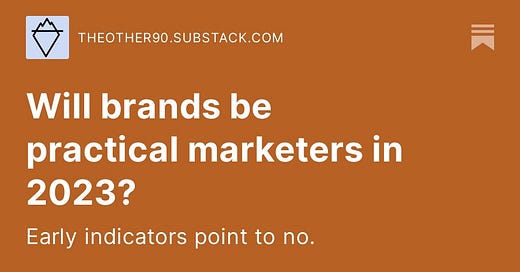Hi. Hey. Hello. This is The Other 90, a blog about strategy from your friends at Quick Study. A recent client says that we “moved at light speed without compromising on research and quality,” and that “I’ll recommend them to anyone who wants to make their brand culturally relevant.”
If this is your first time, welcome! Feel free to check out the archive.
Let’s start here:
I got a text from a friend on Friday morning that crystalized a lot of how I feel about marketing right now:
“I just got a Metaverse RFP from a global investments firm and it’s fun to see how slowly those ships move. This was probably strategized in mid-year 2022.”
I haven’t heard nails on a chalkboard in a long time, but reading that text gave me the same sensation. A truly perfect combination of groan-inducing words - from “metaverse RFP from a global investments firm” to “strategized in mid-year 2022” - that perfectly lays out the mirror so many brands are holding up to themselves right now and calling a plan. Many brands have gotten so caught up in their own world-building that they haven’t looked up to see the world pass them by, and then you end up with a Q1 2023 RFP about the metaverse from a global investments firm that was concepted in house mid last year (already late for the metaverse bandwagon, by the way).
We’ve just passed a year since Paris Hilton and Jimmy Fallon infamously shark-jumped NFTs on broadcast TV, which led me to declare that we had officially reached the era of too much content. But as 2022 went on, it became clear that many brands were, at worst, perfectly content with too much content, or, at best, not built to pivot once the PR machine had moved on to the next new shiny ploy for marketers and stuck executing plans that were too far down the tracks to stop (like the global investment firm above). It was frustrating to watch brand after brand ignore real consumer indicators and instead talk to themselves.
I tried to articulate where I think this leaves marketers in 2023 when I joined my friend Mark Pollard on his Sweathead podcast last week (Apple Podcast link here, Spotify embed below). The episode is a rundown of some of the trends that I believe point to a necessary pivot back to practical marketing, as I laid out in my last post from December. Not every brand needs a deep world to explore, or an NFT, or a Roblox activation. We should be making it easier for people to engage with us by spending time where they are, and not expecting them to come to us.
We also should - and I can’t believe I even need to say this - make sure we keep the quality of our product a top priority. When it comes to what drives purchase, and especially retention, quality is always at the top of the list, yet many brands try to gloss over their quality issues with shiny new ploys like the ones we’ve talked about ad nauseam. It’s indeed common to see brands release new packaging or messaging to change the conversation away from quality, but it’s rare to see a brand bury a potentially positive quality story under something else.
Which brings us to the case of New Belgium Brewing, who they gave their iconic beer, Fat Tire, a rebrand late last year in an attempt to regain some momentum. We have to give credit where credit is due: the brand recognized that it needed to make changes and that its recipe could use a refresh. But instead of using the rebrand as a chance to speak to their new recipe and address the quality conversation, they tried to make the story about sustainability.
A few weeks ago I caught up with Good Beer Hunting, an excellent resource for anyone interested in the business of beer, to talk about why rebranding Fat Tire to be a handheld billboard for New Belgium’s environmental efforts likely won’t move the needle if that’s all they intend to talk about. As we spoke about last fall in this newsletter, the sustainability of a brand is not the deciding factor for most consumers when it comes to purchase, but instead a supporting factor that helps justify the purchase. Quality sits above all else, in beer, clothing, and so much more, which makes New Belgium’s decision to not even inform beer store owners of the recipe shift seem misguided and shortsighted. Now Fat Tire diehards are left disappointed to have lost the taste they loved, and potential new customers aren’t being given a clear reason to try when they see a package that talks about how the beer is carbon neutral instead of how it tastes. It’s a mess of world-building, and a microcosm of how swept up a brand can get in its own story and forget that you still need to find ways to connect that story to an audience that will care. It is, I hope, exactly what brands will start to get away from as the year goes on.
The Other 90 is written by me, Rob Engelsman, a former baby model and now Cofounder & Strategy Partner at Quick Study. To find out more about how we help brands and agencies get to smarter plans faster, email rob@quick.study. You can also find me on Twitter (for now), Instagram, & LinkedIn.



